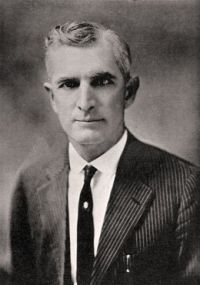
Clifton Mott Caldwell
Appointed by
Term
Occupation
Date of Passing
Notes
The Foreseeable future, Spotlight on History, Fall 2006
by Karen Lundquist (General Law Section of U. T. System Administration)
Cleaning out old files has a tendency to generate stories, like the story Jim Phillips recounted in an earlier version of this newsletter about legendary Texas attorney Percy Foreman. This story has a similar genesis in that it involves a letter found while cleaning out old files in the Office of the Board of Regents. In the letter, a Regent tendered his resignation from the Board of Regents because of a conflict of interest.
As Deputy Ethics Advisor for UT System, I am occasionally asked by the Office of the Board of Regents to research conflict of interest issues. These assignments generally involve issues such as whether a Regent's financial interest would restrict the ability of UT System to engage in business transactions that might affect that interest. However, the situation described in the letter was one I had never before encountered.
The letter from C.M. Caldwell was dated March 1, 1924. According to Mr. Caldwell's letter, he was the vice president of a short line railroad at Breckenridge and had several railroad passes that saved him a substantial amount of money. He stated that he was resigning as Regent because "the Attorney General holds that a man cannot hold the office of Regent and ride on railroad passes." With appreciation for the opportunity to serve as Regent and with some regret, he chose the railroad passes.
These days, it is hard to imagine giving up a public office to avoid having to pay to ride the train. However, in 1924, automobile travel in Texas was in its infancy. Mr. Caldwell's business required him to travel frequently by rail, an expensive proposition if he paid out of his own pocket. Even so, modern conflict of interest provisions would not have resulted in a requirement to choose between holding office or riding the rails for free, and so I was asked to look into the basis for the Attorney General's holding.
Although I found several Attorney General opinions on railroad passes, I was not able to locate an Attorney General opinion that explained the basis for the determination that "a man cannot hold the office of Regent and ride on railroad passes." However, my research allowed a brief journey through the early period of railroad regulation in Texas. According to historical commentary, early attempts to regulate railroads in Texas were largely ineffective. Abuses by the railroad companies and vocal complaints against them resulted in the Constitutional Convention of 1875, which resulted in a new constitutional provision that authorized the Legislature to pass laws to correct abuses by the railroad companies and to prevent unjust discrimination and extortion in rates and fares. That provision was last amended in 1890, the year the constitution was amended to provide for the Railroad Commission and also the year James Hogg was elected Governor based on his efforts as Attorney General to protect the public interests against powerful corporate railroad interests.
Under the authority of the new constitutional provision, the Legislature passed a series of statutes that generally prohibited the granting or use of free railroad passes or passes sold at greater or lesser rates than sold to others for similar transportation. Presumably, this law was meant to discourage railroad companies from abusing their powers by requiring some passengers to pay and letting others ride free or at a reduced rate, depending on the whim of the company. Some of those statutes were enacted in 1907, although most appear to have been enacted around 1911.The statutes provided fines and even imprisonment for violations. Surprisingly, those statutes are still in effect today under Title 66, Vernon's Texas Civil Statutes (Articles 4005 - 4015f).
The statutes exempted certain classes of persons from the general prohibition against free passes. For example, "bona fide" officers and employees of railroad companies were permitted to receive free railroad passes. Mr. Caldwell probably relied on this exception to obtain his free passes. The statutes also permitted a limited class of public officials to ride free, but generally they were confined to officials concerned with law enforcement or public health. Most likely, the Attorney General determined that Mr. Caldwell's status as a Regent trumped his status as an officer of a railroad company and thus, because the statutes did not include Regents in the list of officials permitted to receive free passes, Mr. Caldwell could not receive and use the free passes. To avoid that result, Mr. Caldwell resigned, noting that although his attorney disagreed with the Attorney General's holding, he did so to avoid any question in the matter.
Times have changed, the power of railroad companies has waned, and the concept of choosing between free railroad passes and the office of Regent has been relegated to dusty old files.
Bibliography of works by Clifton M. Caldwell
- Beckham, John L."Clifton Mott Caldwell: Citizen of Texas," West Texas Historical Association Year Book 56. 1980.

